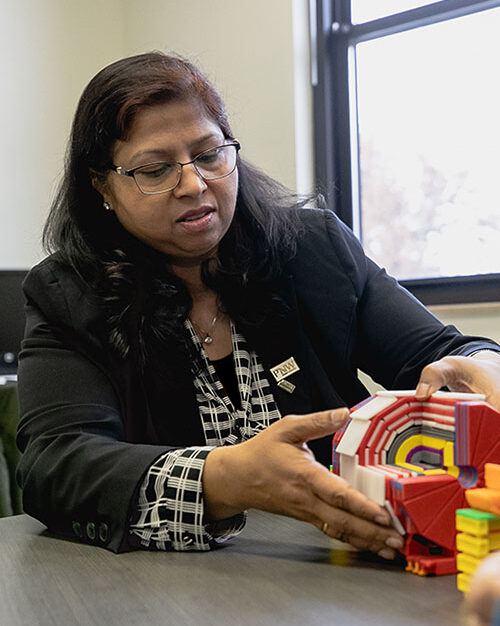PNW designates new Center for High Energy Physics

Neeti Parashar, professor of Physics at PNW, has been a longtime researcher in high energy and particle physics in domestic and international circles. Parashar is the director of PNW’s Center for High Energy Physics, which participates in particle physics research and exposes students at the college and high school level to those research opportunities.
Purdue University Northwest (PNW) has designated a new Center for High Energy Physics (CHEP) that will include the university’s particle and high energy physics research and community outreach programs.
High energy physics is a subfield of physics that seeks to better understand the fundamental particles and forces of nature. The center will leverage its existing programs and promote PNW’s unique status as a member in several circles of world-class physics research.
The center will operate under the leadership of Dr. Neeti Parashar, professor of Physics and the center’s founder and director. Joining her will be Dr. James Dolen, associate professor of Physics, and PNW students to observe and participate in research funded by the National Science Foundation (NSF) at Fermi National Accelerator Laboratory (Fermilab) in Batavia, Illinois, and the European Organization for Nuclear Research (CERN) in Switzerland. High school students participating with PNW’s QuarkNet Center are also able to analyze research from these laboratories using external sources.
“Research conducted under the auspices of the center is at the forefront of the high energy physics community world-wide,” says Parashar. “It places PNW on a global map of fundamental discoveries. We are also in a very unique situation, since PNW is the only high energy physics institution in Northwest Indiana. The creation of the center will provide more leverage for funding opportunities, inviting researchers of recognition and relevance, and aggressively recruiting Physics students into our program.”
Parashar was a part of the research team, comprised of several thousand scientists, who in 2012 discovered the Higgs boson particle, at CERN. The Higgs boson responsible for the origin of mass is dubbed as “the God particle” for the non-scientific audience, in an attempt to explain the genesis of our existence. The scientists’ discovery helped Peter Higgs and Francois Englert earn the 2013 Nobel prize for their predictions of the existence of the Higgs boson particle.
The Center for High Energy Physics at PNW will allow us to highlight the world-class research our faculty are doing in this field, and provide a framework to reach out and train students and teachers at the leading edge of science.
“Research opportunities for undergraduate students at PNW and master class sessions for local high school students will foster exposure to cutting-edge scientific discovery typically only available to post-graduate and doctoral students and other well-established researchers and scientists,” says Parashar.
“High energy physics helps us better understand the very nature of life by focusing on the smallest fundamental building blocks,” says Kenneth C. Holford, provost and vice chancellor for Academic Affairs. “Purdue Northwest is home to two nationally recognized scientists that work in this area. In addition to identifying this as a priority research area, the launch of the Center for High Energy Physics will make these topics accessible and relevant to our community. As a premier metropolitan institution, our goal is to provide cutting edge educational outreach and training for high school students and instructors in the region.”
“The Center for High Energy Physics at PNW will allow us to highlight the world-class research our faculty are doing in this field, and provide a framework to reach out and train students and teachers at the leading edge of science,” says Dietmar Rempfer, interim dean of the College of Engineering and Sciences. “By offering opportunities for students and teachers in Northwest Indiana to study at international laboratory facilities such as Fermilab and CERN, CHEP will expose our students and communities to modern science and facilitate knowledge transfer via several impactful modes of experiential learning.”
Others joining Parashar and Dolen as inaugural faculty members in research, outreach, and teaching through CHEP include Aaron Warren, associate professor of Physics, Gokarna Aryal, professor of Statistics, and Atanu Pathak, postdoctoral researcher of the high energy physics group.
View more information about the Center for High Energy Physics